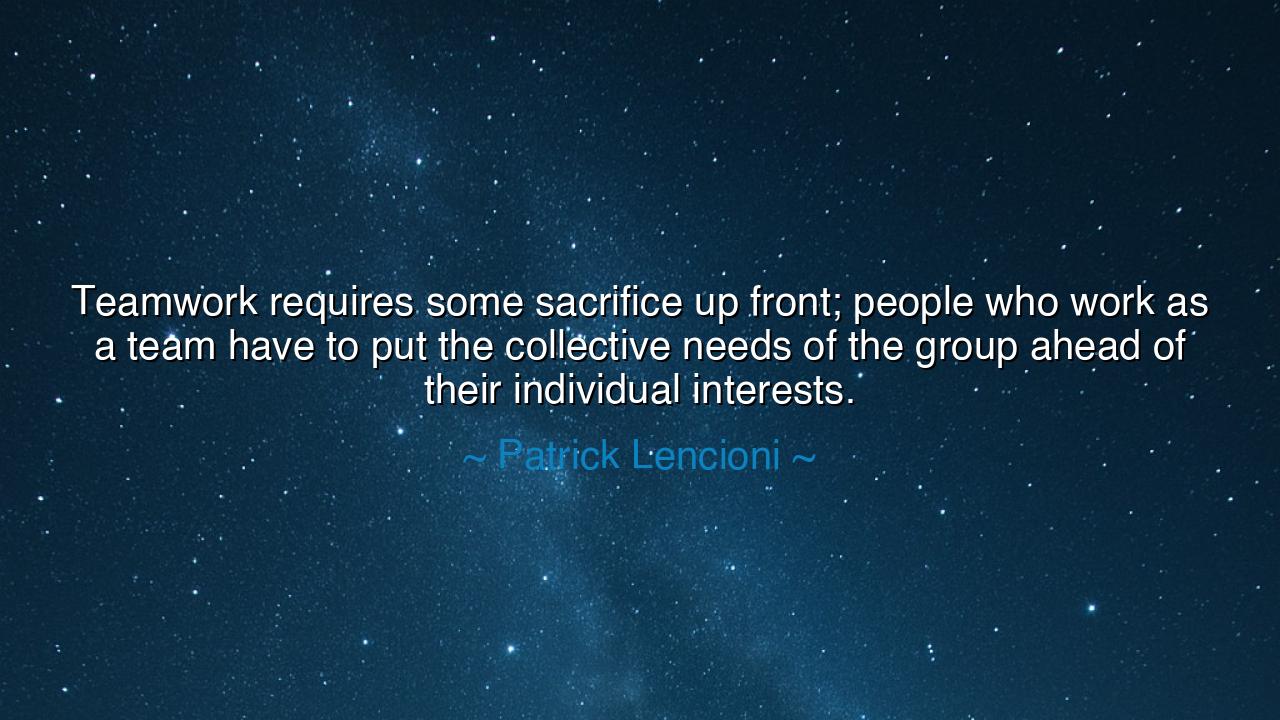
Teamwork requires some sacrifice up front; people who work as a
Teamwork requires some sacrifice up front; people who work as a team have to put the collective needs of the group ahead of their individual interests.






In the great endeavors of life, no single soul can build lasting greatness alone. Patrick Lencioni speaks to this eternal truth when he declares, “Teamwork requires some sacrifice up front; people who work as a team have to put the collective needs of the group ahead of their individual interests.” These words echo like the drums of ancient battles, reminding us that unity is forged not in comfort, but in the surrender of self for the sake of something greater.
True teamwork is a bond of spirits, a gathering of many into one purpose. But such harmony cannot exist when pride and selfish desire rule the heart. The sacrifice Lencioni speaks of is the first offering — the willingness to lay down personal glory so that the group may rise together. This sacrifice is not a loss, but a seed planted, from which shared victory and enduring trust will grow. Without it, no team can stand against the storms of adversity.
To place collective needs above individual interests is an act of profound wisdom and humility. It demands that each member see beyond their own ambitions, recognizing that their strength is magnified when bound to the strength of others. Just as a single thread is weak, but many woven together create a rope unbreakable, so too does the team become mighty when each person adds their will to the whole. This truth has guided warriors, builders, and dreamers throughout the ages.
The origin of this teaching lies deep in human history. In the tribes of old, survival depended on unity — hunters shared their catch, defenders stood shield to shield, and leaders served the people rather than themselves. Those who sought only personal gain endangered all, and their names faded into darkness. Through countless generations, this lesson was carved into the very soul of humanity: greatness is born from shared struggle and mutual sacrifice.
Thus, let this wisdom be passed on to future generations: embrace teamwork not as a burden, but as a path to lasting strength. Offer your sacrifice freely, knowing that the triumph of the group will one day be your own. For when many walk as one, they do not merely achieve a goal — they shape a legacy that endures beyond the span of any single life.






TTHanh Truong Thi
This quote resonates with me, but it also makes me wonder—how much sacrifice is too much? At what point do individual needs become important enough to bring to the forefront, even in a team setting? While teamwork thrives on selflessness, is there a danger in suppressing individual interests for too long? Can we truly find success if we ignore our own needs for the sake of the group, or is a balance the key to long-term harmony?
KHdinh khanh hien
Lencioni’s quote about teamwork requiring sacrifice feels like an essential truth for successful collaboration. But what if the sacrifice needed is too large for some people, or if it feels unfair? How do we address the potential for burnout in a team setting, especially when one person may feel like they are giving up more than others? How can leaders foster a sense of fairness and equality in these situations?
TVTran Thi Thuy Vy
This perspective on teamwork makes me think about how collaboration requires compromise. It’s true that putting the collective needs first is vital for success, but how do we make sure everyone’s voice is heard and their contributions are recognized? Is it possible to keep the balance between working toward the team’s goals while also respecting individual contributions, or does one always have to take precedence over the other?
DHDiu Dinh Huong
I think this quote highlights one of the core challenges of teamwork: the need for selflessness. But does putting the collective first always result in a harmonious team? What happens when individual needs go unmet for too long? Can a team remain strong if its members feel like they’re constantly sacrificing without recognition? It’s a delicate balance—how do we ensure that sacrifices are fair and not exploited?
DPdungxx pham
Patrick Lencioni’s quote about teamwork really speaks to the balance between individual and collective needs. The idea of sacrificing upfront for the greater good is important, but how do we ensure that the sacrifice doesn’t lead to resentment or burnout? Is there a point where people can give too much for the team, and how do we prevent that from happening while still achieving success as a group?